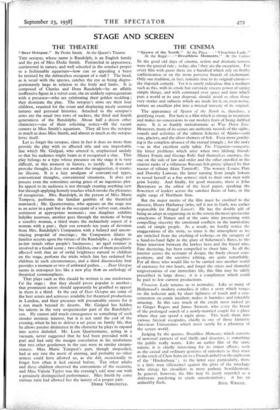STAGE AND SCREEN
THE THEATRE "Dear Octopus." By Dodie Smith. At the Queen's Theatre THIS octopus, whose name is Randolph, is an English family and the pet of Miss Dodic Smith. Patriarchal in appearance, sentimental in nature, and well schooled in the conduct proper to a fashionable aquarium—how can so appealing a beast be resisted by the defenceless occupant of a stall ? The head, as is usual with the species, catches the eye as being dispro- portionately large in relation to the body and limbs. It is composed of Charles and Dora Randolph—he an affable inoffensive figure in a velvet coat, she an unlikely septuagenarian with a presence—who are celebrating their golden wedding ; they dominate the play. The octopus's arms are their four children, reunited for the event and displaying nicely assorted natures and personal histories. Attached to the octopus's arms arc the usual two rows of suckers, the third and fourth generations of the Randolphs. About half a dozen other characters—one of them soliciting notice—fill the vacant corners in Miss Smith's aquarium. They all love the octopus as much as does Miss Smith, and almost as much as the octopus loves itself.
Let us forget the octopus, since in fact it does no more than provide the play with an affected title and one improbable line which Mr. Gielgud, who uttered it, emphasised unduly so that his audience might beam as it recognised a clue. This play belongs to a type whose presence on the stage it is very difficult, at this moment in history, to justify. It does not provoke thought, it does not awaken the imagination, it creates no illusion. It is a lazy amalgam of conventi anal types, conventional thoughts, conventional situations. It does not possess even the sometimes saving grace of an ingenious plot. Its appeal to its audience is not through creating anything new but through applying homely touches which invoke the pleasures of recognition. Mrs. Randolph, in the person of Miss Marie Tenipest, performs the familiar gambits of the theatrical matriarch ; Mr. Quartermaine, who appears on the stage not as an actor in a part but as the occupant of a velvet coat, exudes sentiment at appropriate moments ; one daughter exhibits ladylike neuroses, another goes through the motions of being a sensible woman, a third wears the melancholy aspect of a woman with a past ; their son rewards ten years of devotion from Mrs. Randolph's Companion with a belated and uncon- vincing proposal of marriage ; the Companion dilates in familiar accents upon the virtues of the Randolphs ; a daughter- in-law 'minds Other people's businesses ; an aged retainer is involved in a feudal scene ; two children, one of them peculiarly affected with that air of awful brightness natural to children on the stage, perform the tricks which fate has ordained for children in such circumstances, and a third disconsolate brat provides a moment or two of awkward pathos. . . . Dear Octopus seems in retrospect less like a new play than an anthology of theatrical commonplaces.
That plays such as this should be written is one misfortune far the stage ; that they should prove popular is another ; that prominent actors should apparently be gratified to appear in them is a third. In the cast of Dear Octopus are some of the best actors and actresses available for theatrical productions in London, and their presence will presumably ensure for it a run much beyond its deserts. Mr. Gielgud has hidden his talents in the very unspectacular part of the Randolphs' son. He cannot add much consequence to something of such slender intrinsic interest, but it is not until the end of the evening, when he has to deliver a set piece on family life, that he allows passive disinterest in the character he plays to expand into active disbelief. Mr. Leon Quartermaine, acting in a vacuum, never suggested that he had been provided with a part and had only the meagre consolation in his misfortune that two other gentlemen in the cast were in similar circum- stances: Miss Marie Tempest's part, though shopsoiled, had at any rate the merit of existing, and probably no other actress could have allowed us, as she did, occasionally to forget how often it had existed before. Ten other adults and three children observed the conventions of the occasion, and Miss Valerie Taylor was the evening's odd man out with a genuinely distinguished performance. Miss Smith by some curious turn had allowed her the luxury of,a proper part.
DEREK VERSCHOYLE.






































 Previous page
Previous page